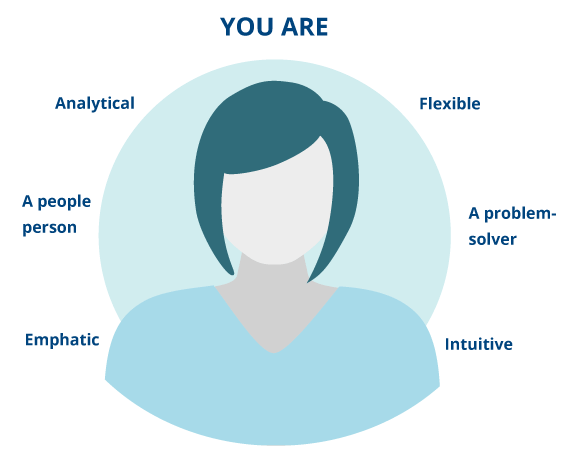Clinical Psychology
Education and Careers
Clinical psychologists diagnose and treat people with intellectual disabilities to help improve clients’ mental health and sense of well-being. It’s a highly practical and solution-oriented specialty for people who want to help others help themselves.
What Is Clinical Psychology?

Psychologists help people from all backgrounds and treat human problems common to many of us. They help people overcome depression, anger and anxiety. They also treat chronic conditions that interfere with their clients’ lives or physical health.
Clinical psychologists teach people to cope with stressful situations, overcome addictions, improve their relationships with their husband, wife or parents, and break through barriers that keep people from reaching their potential. They also give psychological tests to evaluate cognitive strengths and weaknesses, personality characteristics, and more.
Skills You Need
If helping people improve their mental health, well-being and quality of life is important to you, clinical psychology may be the right career choice. Learn which personal and professional traits you’ll need to succeed in this career.

You should have…
- Strong verbal and communication skills – Practitioners will need to be able to effectively communicate with clients in a supportive and possibly delicate manner. They must also communicate clinical concepts and observations to family members and colleagues.
- Good writing skills – Thorough note taking and report writing is a major part of how clinical psychologists track and record a client’s progress.
- Goal-setting skills – Every client will have different goals and a different timeline for meeting those goals. Clinical psychologists will need to balance realism with ambition when setting these goals.
- High ethical standards – Probing someone’s deepest feelings and most troubling psychological states puts them in vulnerable position. Practitioners must be aware and respectful of all the complex ethical issues that creates.
- Clear boundaries – Clinical psychologists will need to get close to clients without crossing emotional and physical boundaries defined by professional standards and by the client/practitioner.
- Ability to focus – Providing effective treatment requires careful observation and intense attention to detail.
How to Become a Clinical Psychologist
Clinical psychologists must be licensed to practice in their state. Generally, you’ll need to have a doctorate in psychology and one to two years of experience under the guidance of a mentor to qualify for licensure.
Step 1: Get a Bachelor’s Degree in Psychology
To specialize in clinical psychology, you’ll need the knowledge and skills of other psychologists. You’ll first need an undergraduate degree with a psychology major.
Step 2: Get an Advanced Degree in Psychology
To get into a master’s graduate program in clinical psychology, most schools look for a good score on the GRE (above 1200), a GPA of 3.5 or higher, and experience in the field.
Step 3: Complete an Internship
All clinical psychology programs require you to do an internship. Internships in clinical and counseling psychology must generally be approved by the American Psychological Association.
Step 4: Pass the Psychology Exam
You will need to pass the Examination for Professional Practice in Psychology. If you have questions, contact the Association of State and Provincial Psychology Boards.
Step 5: Apply for Licensure in Your State
In order to practice psychology you must be licensed by your state. Most states require approximately two years of supervised clinical hours after you earn your PhD, PsyD, or EdD.
Education to Become a Clinical Psychologist
There are quality clinical psychology programs available throughout the country and in both in-person and online environments. In fact, quite a few accredited online schools offer clinical psychology degree programs at both the bachelor’s, master’s, and PhD level.
No matter which environment you choose, you should look for accreditation by the American Psychological Association, which is a specialized accreditor, and the Higher Learning Commission.
Since we all know school is expensive, you’ll be eligible to apply for financial aid if your program is accredited as well. First, you’ll need to fill out the Free Application for Federal Student Aid (FAFSA). You’ll also have access to clinical psychology scholarships, grants, private loans, and PLUS loans.

At the undergraduate level, students will learn about the fundamentals of psychology including the history of the discipline, necessary math and science skills, and coursework relevant to specific types of clinical psychology. Students will typically supplement required coursework with electives that help them to broaden their understanding of the world and the issues facing their future clients.

At the master’s degree level, students will begin to focus their studies towards specific conditions, treatment philosophies, and patient populations. An adviser will help students tailor their coursework to their future career objectives, whether the goal is research, academia, or a specific area of focus such as sports psychology. At this level, clinical psychologists will get their first hands-on experience with clients, and will typically be required to complete a comprehensive research project or thesis to graduate. With a full course load, most programs can be completed in one to two years. Some clinical psychology positions like Marriage and Family Therapist only require a master’s degree before entering practice.

Doctoral students will receive the most advanced training in clinical psychology. Admissions committees will consider a student’s grades, test scores, recommendations, research experience, and personal/professional accomplishments when determining who to admit. Coursework will be required, but the majority of the program will center around independent research concluding in a comprehensive thesis. The length of these program varies but typically does not exceed seven years. Students who enter with a master’s degree may be able to finish in three to four years.
Meeting the Internship/Residency Requirement
In order to gain advanced levels of competency while proving that they can meet the long-term needs of diverse patient populations, clinical psychologists will need to complete a comprehensive residency/internship upon graduation. The length of these programs varies by state but traditionally lasts one to two years. The resident will work under close supervision in a single clinical setting. They usually earn a stipend or salary while participating in the program.

Earning Licensure

The final step necessary before working as a clinical psychologist is being granted a professional license. Each state sets different standards for licensure based around the required quality/quantity of education, and a prescribed number of hours working directly with patients. All clinical psychologists will also need to pass a 225-question multiple choice test developed by The Association of State and Provincial Psychology Boards (ASPPB). Students are advised to progressively record their credentials in the National Psychologist Trainee Register or the ASPPB’s Credentials Bank in order to expedite the licensure process. In order to maintain a license, clinical psychologists usually have to pursue continuing education and avoid breaches of professional conduct.
What You Can Do as a Clinical Psychologist


It is difficult to make generalized statements about the work of clinical psychologists because their professional obligations vary so widely. Most work in some sort of social care setting like a hospital, community health organization, school district, court system, or group home. Some also work in private practice or dedicate their careers primarily to research.
In practice, most clinical psychologist work specifically with a certain patient demographic or certain mental health issue. Some focus on the mental health needs of children and adolescents. Others specifically treat addiction, obsessive behaviors, or PTSD. Most clinical psychologists pursue training throughout their careers to expand the depth and breadth of their treatment abilities.
A number of factors influence whether a clinical psychologist should work in private practice or for an institution. While private practice offers flexibility, it also has its challenges. If you’re new to the field and lack a large patient base, you’ll need to work hard at marketing yourself and getting referrals. This will be an on-going process throughout your career. Working at an institution allows you to gain valuable knowledge from colleagues, enjoy employer-paid benefits, and business needs, such as payroll, are managed by someone else.
How is a Clinical Psychologist Different than a Psychiatrist?

The distinction is small but significant. Clinical psychologists typically earn a doctorate but are not considered medical doctors. They focus on mental health and well-being but are barred from prescribing drugs or performing medical interventions. Psychiatrists go to medical school and then complete years of training specifically in psychiatry. Afterwards, they are permitted to prescribe medications. There is a fair amount of overlap between these two professions, and practitioners often work in collaboration to meet the complete needs of patients.
Salary and Job Growth
According to the U.S. Bureau of Labor Statistics (BLS) 2023 Occupational Employment Statistics, the median salary for clinical psychologists is $96,100. Actual salaries vary greatly based on location, specialization, years of experience and other factors.
Compare psychology salaries below:

$147,420
Organizational Psychologists

$96,100
Clinical and Counseling Psychologists

$84,940
School Psychologists

$117,750
All Other Types of Psychologists
Employment of clinical psychologists is expected to grow 11.4% through 2032, according to the U.S. Bureau of Labor Statistics. Demand for psychologists in schools, hospitals, mental health centers and social services agencies should drive this job growth.
Job Growth
11.4%
Related Occupations
Here are some other fields you might like if clinical psychology isn’t exactly what you’re looking for:






